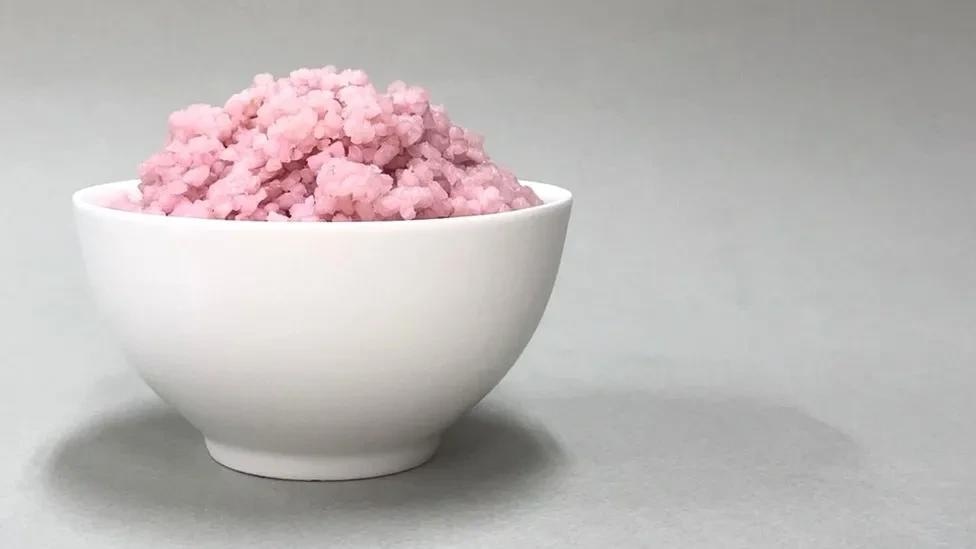Researchers from Yonsei University have engineered a new sustainable food that could be a “shortcut to a sustainable food system,” safeguarding society from both global warming and food crises. This novel hybrid food, a ‘meaty’ rice, has been hailed as an economical, environmentally-friendly source of protein.

Image Credit: Yonsei University
Rather than attempting to grow animal cells into large meat-like structures, a process fraught with difficulties, Jinkee Hong and his team at Yonsei University in Seoul, South Korea, sought to merge rice grains with cultured animal cells, aiming to produce a “new complete meal.”
By embedding animal muscle and fat cells into the grains of rice, this hybrid food could potentially revolutionize protein consumption in industries ranging from agriculture to aerospace, providing a scalable, eco-conscious alternative to traditional livestock farming.
The Creation Process
The creation process involves coating the rice grains with fish gelatine, which acts as an adhesive for the beef cells. These modified grains are then cultured, transforming them into a nutrient-rich food source.
With its enhanced nutritional profile, boasting 8% more protein and 7% more fat than conventional rice, this hybrid rice stands as a testament to the possibilities of cellular agriculture. Its application extends beyond sustenance, offering a strategic solution for famine relief, military provisions, and even as a viable food source for space missions.
The environmental impact of this innovation is also crucial to note, with a significantly reduced carbon footprint compared to traditional beef production.
The researchers have demonstrated that for every 100 g of protein produced, this hybrid rice generates less than 6.27 kg of CO2, significantly lower than the 49.89 kg attributed to conventional beef. This reduction in greenhouse gas emissions underscores the potential of such advancements in mitigating climate change and promoting sustainable food systems.
This hybrid rice, while more protein-dense, exhibits a slightly firmer and brittler texture compared to regular rice. However, the prospect of integrating animal-derived nutrients directly into a staple crop like rice opens up new avenues for addressing global nutritional needs without exacerbating environmental degradation.
The adaptability of rice as a scaffold for meat cell growth, coupled with its inherent nutritional value, amplifies the potential of this hybrid food to contribute significantly to the global food landscape.
Lab-Grown Meat: Is it a Viable Sustainability Solution?
The field of lab-grown meats has seen substantial progress since the debut of the first lab-grown burger in 2013. With countries like Singapore embracing cultivated meat products and the ongoing debates regarding the cultural and ethical implications of lab-grown meats, the development of this ‘meaty’ rice adds a new dimension to the discourse on future food sources.
Despite the technical knowledge required to create this hybrid rice, consumer acceptance remains a pivotal factor in its market viability. The blend of traditional grain with lab-cultured meat cells challenges conventional dietary norms, necessitating efforts to educate and acclimate the public to the benefits of such innovations.
As the global community grapples with the dual challenges of ensuring food security and environmental sustainability, this ‘meaty’ rice embodies the synergy of agricultural tradition and biotechnological innovation, heralding a new era in food production.
The development of ‘meaty’ rice by Yonsei University’s researchers marks a significant stride towards sustainable, efficient protein sources. By marrying the nutritional benefits of rice with the protein richness of beef cells, this hybrid food promises to make a substantial impact across various sectors, offering a scalable, eco-friendly alternative to conventional protein sources. As we move forward, the integration of such innovative food solutions will be crucial in shaping a sustainable, nutritionally secure future.
References and Further Reading
Roberts, M. (2024) Scientists grow ‘meaty’ rice hybrid food for protein kick, BBC News. Available at: https://www.bbc.co.uk/news/health-68293149 (Accessed: 15 February 2024).
Park, S. et al. (2023) Rice grains integrated with animal cells: A shortcut to a sustainable food system [Preprint]. Available at: https://www.cell.com/matter/abstract/S2590-2385(24)00016-X.